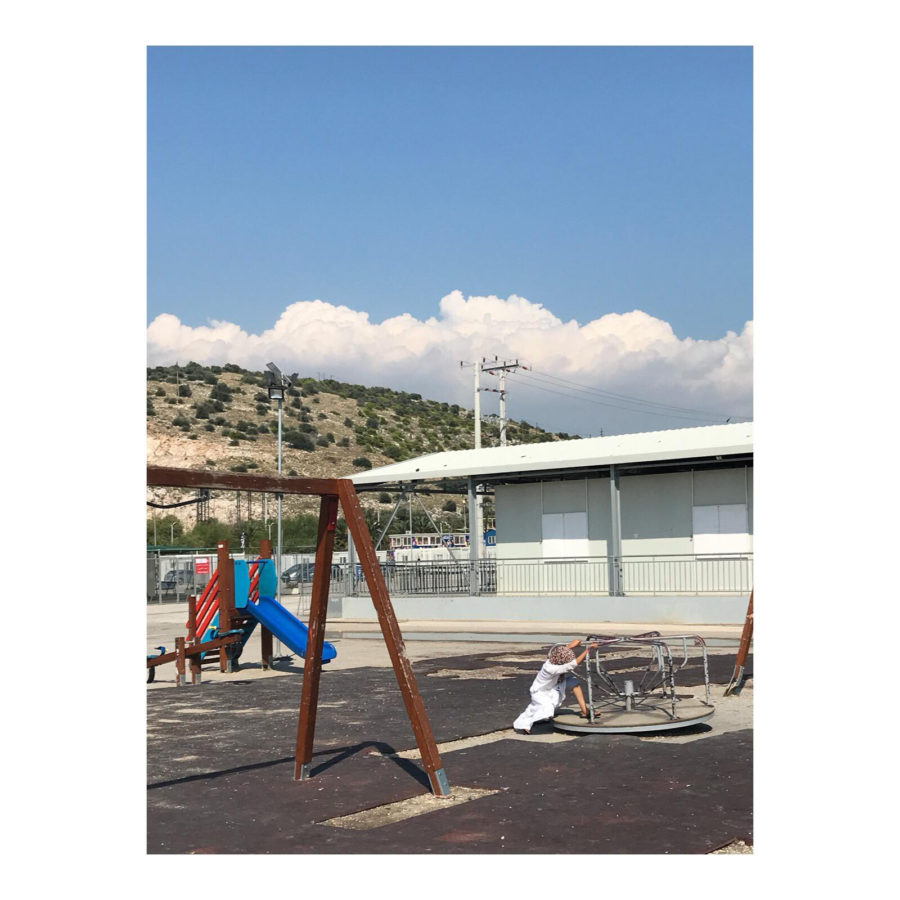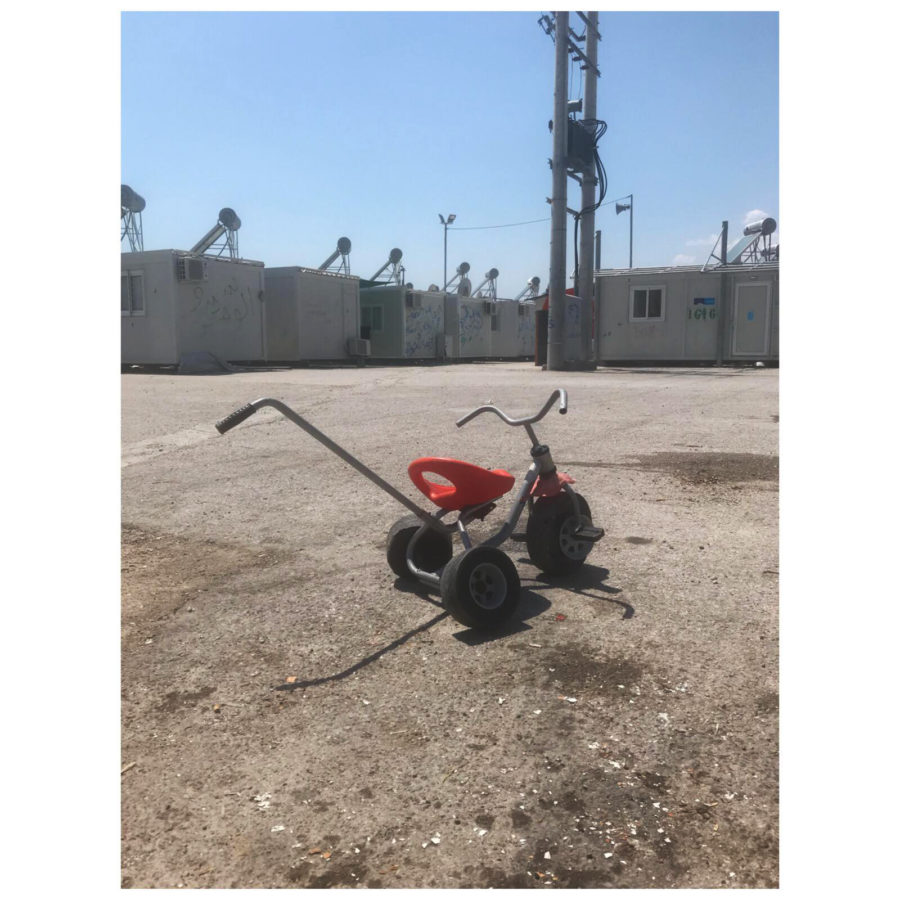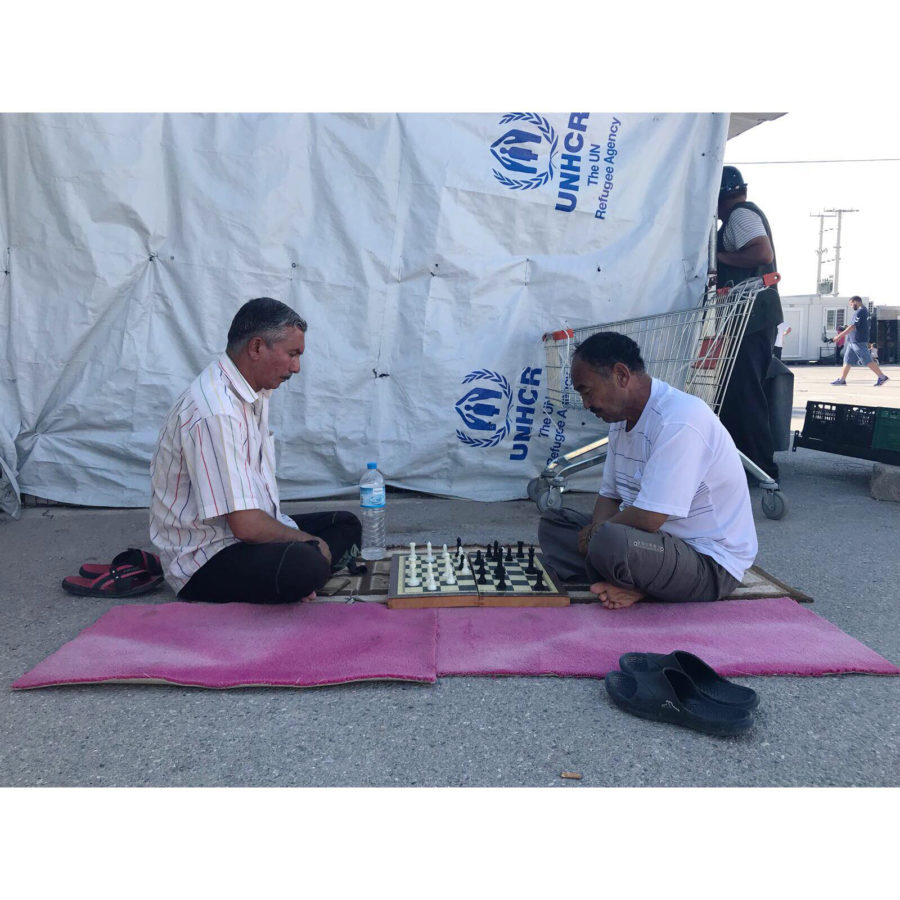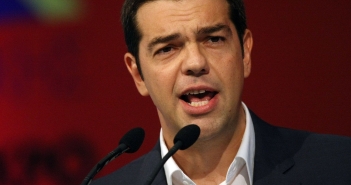I raise myself into the UNHCR’s prefrabricated 10×20 ft unit; directly in front of me is the 5×4 latrine I was looking for. Occupied. I’ll have to wait, glad, in fact, just to be cool.
I turn my attention left to the man whose workplace is this metal container, a stocky Afghan, with thick, combed, black hair. I’ve seen him before, here and around the camp. There is a warmth about his demeanour – he has a smile that makes you want to smile – offset however by an expression alluding to something more cerebral about his character. His deep set eyes haven’t escaped my notice, and ever suggest his mind is attending to thoughts which, evidently, prompt less than a continuously cheerful disposition.
I’m a little bit nervous, I suppose. So I lean against the cool interior, the idea being that a casual comportment will mask any anxiety I feel, now that I’m in this man’s space. Its thirty-five degrees outside – ‘hot’, I gasp, and raise my eyebrows. He nods in jovial agreement.
Now more comfortable, I look around the room. A shaded white room, with laminate flooring, the equidistance of the wall-to-wall-to-ceiling dimensions induce feelings of claustrophobia, though he seems comfortable. He stands to one side, elbow on the sill of the window, two dainty tables and an equally dainty chair to his other side.
On one of the tables I spot something about which in the past I’ve been curious; so I now take the opportunity to query the small packages stacked on the collapsible tables to his left. He gives them a glance, and then his eyes revert to me, once more. Fifty food packages, I now understand, for the fifty unaccompanied children, currently residing in Camp Skaramangas – the parentless refugee children ten kilometres north-east of central Athens.
I look at the packages and I look back at him again, alert and no longer leaning. ‘What’s … the story?’ I nervously query, the idiomatic expression revelatory of more than mere linguistic dissonance. He is himself a refugee and it is experiences such as these that remind us that this does indeed warrant its own respect. He paces a little and tells me of the children whose parents may not have made the journey – they could be dead, back home. Silence.
‘It’s very sad,’ he quickly concludes, in that way you would hope someone in charge of dispensing such basic essentials to parentless children, in a refugee camp, would, before moving on. He sits down onto the chair. ‘That’s awful,’ I concur trivially. Contrasted with my own, now no longer casual, attempt to compose myself, his expression, his tone and his body language exhibit a capacity to appreciate the gravity of what has prompted, for me, little else than a compulsion to muster an appropriate response, unsuccessfully, and in lieu of it arising naturally.

Contemplating such human horror can of course be difficult for the onlooker, such difficulty being only amplified when it relates to utterly innocent children. One is witness to a human experience of which a claim to understanding would amount to no less than impertinence – our empathic powers curtailed given those experiences which cannot be graphed in the thin air of speculation.
But despite this, perhaps even in spite of it, one also feels constrained to recognise no mere accident – innocent children, recall. A symptom of an injustice, a failing, a signature of what is wrong with the world; and in its symptomatic nature what is at once intangible, becomes oddly tangible.
A human experience so far removed from my own becomes that which I feel compelled to pronounce should not be. Momentarily unhinged, a witness to the unspeakable, sense making becomes the urgent prerogative of our sociality. Yet the process in which this encounter with horror gives way to the attempt to determine it as an injustice, brings with it the unsettling self-consciousness of the futility of one’s reaction to so unspeakable an experience, even hypocrisy, as injustice is decried from the comfortable position of distance. Some moments later I am finished with the facilities and nodding a goodbye to the UNHCR man, before exiting back out to the midday sun.
I remember first entering Camp Skaramangas following a brief induction in a petrol station café, outside the camp. A smoking area, on the platform and amongst the petrol pumps created an atmosphere that rules were, here, suspended. In the café we introduced ourselves before discussing the details of what we would be doing as volunteers in the refugee camp, nearby.
Through a gate guarded by the Greek navy security services we walked onto the port and into the camp, gravel crunching below our feet. Few people could be seen, although it was an area wherein over two thousand people resided, in the many white steel units we could now see before us – a truly cosmopolitan setting with people from countries including Afghanistan, Syria, Iraq, Palestine, Iran, Sudan and more. I was of course quickly on good terms with a fellow volunteer from Coventry. We walked into the camp and we were guided through the areas in which we would be working, and shown the facilities we would be occupying. A few early risers could be seen dispersed walking to and fro.
Young men, the likes I had previously visualised in the images of refugees ‘marching’ along European railway tracks (the connotations of an invasion framed with such percipience) strolled casually by; women and men pushing trolleys of watermelon, appeared busy, as children, similar in appearance to the young Alan Kourdi whose body appeared on our screens in what seems now like a moment in history, either aided their elders or ran around guilelessly in the early morning hours, as children do.
Nervously, we tentatively followed the coordinator’s lead, meeting a few volunteers on the way – a mix of Spanish, English, Norwegian and Dutch accents filled the air.
Then could be heard the tones ringing out from the residents, an altogether more foreign sound. Suddenly the nervousness I was feeling, given these new surroundings, began, as we paced through, to transmute into something else. Amid what I superficially took to be more and more foreignness, I felt myself becoming quite self-conscious. And in fact, I now felt foreign.
An uneasiness began to settle, as I became conscious not only of the colour of my skin but my attire, my sunburn, my lanyard which felt all the more pathetic an officiation of my presence. I was entering a space wherein I found faces, half-familiar, having seen them on television and in the news, looking back at me, and I was aware of this.
I suddenly felt like an imposition. There was a feeling I could not shake. Although I was there to help, my being, my presence, felt as though it was imbued additionally with something less benign; taking time away from the everyday goings on of European living to offer my aid to an ‘otherworldly’ situation. Basically I began to feel anxious that people might be looking at me with some bitterness, as a Westerner.
Of course, I quickly met residents who expressed such a welcome that thoughts of their being bitter, or resentful, were not only quashed but gave way to an understanding of their having a diametrically opposite disposition; additionally for anyone who may have viewed my presence with bitterness, albeit in silence, I am inclined to suspend judgement given an understanding of the as good as warrant such bitterness has at its disposal, in view of the both historical and current catastrophes for which the West is deeply responsible, and in accordance with which the lives of many have been coerced.
In any case the feeling was there. Introduced to the impoverished conditions of those on the Athenian port (all of whom have a story of struggle, if not travesty, and such uncertain futures, that their capacity to endure, nevertheless, is nothing short of remarkable), I was conscious of how I represented a life which they did not enjoy.
That subtle feeling of anxiety, embarrassment, shame, which in the coming days I would be able to suppress (given the very flattering gratitude of the residents, not to mention the self-congratulation to be enjoyed in the company of my fellow volunteers), seemed to allude to some tacit recognition that my presence truly was less than benign. And, there was a feeling that despite appearances, despite the fact that in volunteering I may have appeared to care, I represented a way of life the hypocrisy of which was more typically manifest in the choices I made to more often than not, not so much as give them a second thought. It quickly felt a bit superficial.

The fifty children, parentless, and who spend much of their day roaming around what is little more than a barren car park on what was once an Athenian shipping port and whose vulnerability can be all the more sickeningly contemplated should one consider the likelihood of the near presence of human trafficker’s, may indeed prompt one to conjecture that the world is bereft of justice.
But in the absence of provisions, recognition of such injustice seems as pertinent as an acquaintance with the same may be brief. Of course there is the work of the Afghan of the UNHCR, for example, with the unaccompanied children, providing for their desperately needed conditions of growth, the food packages of course being the most basic instance of initiative, in this regard. But my volunteering hardly compares, and truth of the matter is that following the feel good experience I of course did just look away.
I spent the morning and early afternoon of my last day volunteering in Camp Skaramangas with the children before having lunch with a number of the volunteers and residents. Volunteers come and go so you do not say goodbye to the children.
So many goodbyes would be cruel, never-mind the psychological impact. So I just said goodbye to friends in the early afternoon, and then left the camp and its over two thousand residents. A number of hours later I was standing on a runway having just landed in Sofia airport, slightly dazed amid unfamiliar voices, and struck by the attire, but particularly the moustaches, of a number of my fellow eastern European passengers.
It was roughly 9 pm and I was at this point keen to get to my hostel sooner rather later. From the runway we were guided into the airport, through the glass doors and into a large square room which led to a number of steps at the top of which was Bulgarian Passport control. We shuffled into the room, fatigued couples not speaking, children re-energised now they were finally off the plane.
Airports and the security therewith have a way of making us all feel suspect. But being a young Irish man, and landing in Sofia, from Athens, any nerves were on this occasion eclipsed by a rather indulgent self-confidence, my being a man on the road. I stood upright, passport in hand and shifted determinately amongst my fellow travellers toward the security personnel above.
But five minutes, then ten minutes, then twenty minutes went by, and as the man fashioning the perm came to lose what was at first his amusing quality, and as retaining posture became tiresome, the experience as a whole quickly enough became all the more frustrating. It appeared as though very little progress was being made and I came to question the old fashioned border checking that I had not been accustomed to in Western Europe.
Had it not been for the language barrier I might have made more of an effort to engage in the mutterings of those in my company. Increasingly frustrated, I started to observe the minutes go by on my watch, arm rigid. Perspiring ever so slightly now with the frustration, and with my passport in hand, waiting freely to access Bulgaria, what an utterly ludicrous image I was.
Craving my counterfeit cigarettes, purchased only that morning from an entrepreneurial resident of Camp Skaramangas there I was, shamelessly agitated at what was a forty minute wait for my rightful access to a country, a right so shamefully taken for granted.
People wait years to get through European borders, and not for a holiday; good people who I had only that day had lunch with, and who had only a few hours previously expressed gratitude for my efforts in the camp, efforts the sincerity of which I could not now help but think was void.
Given the mere hours that passed, the dictum ‘Out of sight out of mind’ came to mind, as my supposed concern for the horror of such vulnerability encountered only that morning rather belatedly reminded me of what is worthy of our frustration. Failing to uphold, satisfactorily or efficiently, my right to free travel through borders, I found myself naturally irritated – as a European citizen, I expected better. Not so for those without that birth-right. They can continue to wait.
When I tell people this story they offer consolations: at least I volunteered – apparently enough to neutralise the fact that even should such an effort imply that I view the residents of Camp Skaramangas as equals, my behaviour suggests otherwise.
Of course, I can hardly be expected to live frustration-free, given the comparative triviality of whatever situations may arise. Nevertheless, the alarming rate at which one can forget, immersed, once more, in those comparatively trivial struggles, intimates what little hope there might be for those who most need the attention of others.
For the issue is all the more unsettling given the effectiveness of nullifying any concern we might have for those who must wait, through their being removed from our field of vision, as people close by.
In a political atmosphere in which it is often suggested that it is migrants who pose a threat to ‘our’ way of life – Hillary Clinton being amongst the most hypocritical of recent voices for this sentiment – efforts to cast our eyes away from those on the shores of Europe and to the concerns of those individuals, who through the fortune of birth are entitled to expect better in life, portends the upholding of human inequality as an increasingly more likely and well-sustained global state of affairs. For of course, should we not look, we need not be concerned: out of sight, out of mind.
Did you know that Cassandra Voices has just published a print annual containing our best articles, stories, poems and photography from 2018? It’s a big book! To find out where you can purchase it, or order it, email [email protected]




